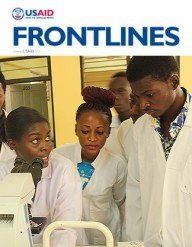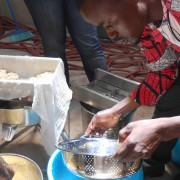 A Garden City University College instructor teaches microscopy.
GCUC/Seeding Labs
A Garden City University College instructor teaches microscopy.
GCUC/Seeding Labs
 A Garden City University College instructor teaches microscopy.
GCUC/Seeding Labs
A Garden City University College instructor teaches microscopy.
GCUC/Seeding Labs
Speeches Shim
Across Ghana’s health sector there are critical shortages—from nurses and midwives to radiologists and medical laboratory technologists.
Garden City University College (GCUC), a small private university in Kumasi, Ghana, about 150 miles from the capital Accra, strives to fill these critical gaps in the health workforce.
Albert Acquah, chancellor and founder of GCUC, describes how the school adapted to meet the most urgent needs. In 2007, the institution became the first private university in Ghana to offer a bachelor’s of science in nursing. At the same time, hospitals and clinics desperately needed technologists and biomedical scientists to deliver accurate and reliable laboratory results to diagnose patients, but there were only two other schools in Ghana offering that training. So the school introduced a medical laboratory technology program in 2013. That same year, GCUC obtained accreditation for new degree programs in midwifery and physician assistantship, also areas with critical personnel shortages.
Students at GCUC, however, struggled with equipment shortages. In the medical laboratory technology program, for example, there were no refrigerators to preserve specimens or basic diagnostic equipment to test blood. Students traveled to universities across the state to do basic experiments and contracted outside vendors to run medical tests.
Acquah scoured craigslist, Ebay, and other online auction sites and spent his weekends driving up and down the east coast of the United States, where he lived part of the year, in search of lab furniture, microscopes and medical mannequins.
The equipment was expensive and often missing parts, so he bought new parts, made what repairs he could and sent it to Ghana. Still, the school just couldn’t keep up with equipment and infrastructure needs.
An Unexpected Solution
The solution to GCUC’s equipment needs came from an innovative social enterprise called Seeding Labs. Through its Instrumental Access program, this Boston-based organization, supported by USAID’s Global Development Lab, distributes high-quality scientific equipment to research institutes and universities in low- and middle-income countries at an affordable price.
Seeding Labs employs a rigorous process for screening applicants as well as equipment. Since 2001, Seeding Labs has provided equipment and training worth more than $15 million to 48 universities and research institutions in 27 countries. The enterprise sources high-quality new and gently used lab equipment and supplies from biotechnology, pharmaceutical and manufacturing companies’ surplus, overstock or traded-in equipment inventory.
Participation is affordable but not free—participants like GCUC pay a share of the cost based on their country’s income level as defined by the World Bank. This helps defray some of the costs of procuring, storing, handling and shipping equipment as well as administering the program. Seeding Labs is the only U.S. organization to provide this kind of service.
Acquah discovered Seeding Labs while doing a simple web search. He teamed up with a GCUC biological sciences professor to complete the application. From a pool of 67 applicants, Seeding Labs chose GCUC as one of the 16 exceptional university departments to receive donated lab equipment.
Seeding Labs CEO and founder Nina Dudnik said that Garden City University College was a perfect fit for her nonprofit because of the school’s focus on innovation, practical education and community service. Seeding Labs partnered with the university’s Department of Medical Lab Technology. “It’s difficult to imagine a department with a clearer need for well-equipped laboratories, as what could be more important for future laboratory professionals than hands-on training?” says Dudnik.
The Seeding Labs shipment arrived at GCUC in August 2016 and included contributions from 31 U.S.-based corporations, universities and research institutes including Merck; Takeda Pharmaceuticals, through their Access to Medicines initiative; and Thermo Fisher Scientific. It contained nearly 3 tons of equipment—a PCR (polymerase chain reaction) machine, incubators, safety hoods, spectrometers, microscopes, a liquid separation system, laboratory refrigerators and freezers, and a biosafety cabinet.
Unlike equipment from auction sites, the equipment was tested before shipping, and GCUC and Seeding Labs made sure the university had technical personnel ready and able to install it upon arrival.
Opening a World of Opportunities
Acquah credits the equipment from Seeding Labs with opening “a world of opportunities in training and development of scientists.” More than 1,500 students are now using the equipment to develop the skills they need to become medical laboratory technologists, biomedical scientists, nurses, midwives and other critically needed health workers.
Students in the nursing and medical technology programs no longer have to make long trips to other universities or contract with outside vendors to conduct blood tests. In the biological sciences department, students are exploring the use of alternatives to blood, such as saliva and urine, to develop low-cost diagnostic tools for diagnosing tropical diseases.
Dr. Yeboah Marfo-Debrekyei, head of the Department of Medical Laboratory Technology at GCUC, recalls that “the students were highly motivated when they entered the laboratories to be greeted by the vast number of new equipment.”
“Seeding Labs has really made our school a legitimate science program. We can attract students who really want to learn,” says Acquah.
Dr. Annica Wayman, division chief of research partnerships for development at USAID’s Global Development Lab, describes how Seeding Labs connects tools with local talent: “The universities and research institutions we work with around the world consistently describe access to equipment and technology as a top barrier. The kind of partnership that Seeding Labs builds with U.S. companies generates significant impacts—high-quality equipment unlocks local scientific talent and ensures scientists and medical workers have the right training and skills.”
Now that GCUC has the equipment to do research, the college is considering a new master’s program in immunology. The school is also pursuing a private-sector partnership to build a training hub with state of the art equipment to train CT (computerized tomography) scan technicians and radiologists.
And increasingly, GCUC is becoming a model for other schools. Acquah proudly says that the accreditation board sends officials from schools across Ghana to see his labs. And he has been collaborating with the head of a medical laboratory school to set up a technical training college in Zambia.







Comment
Make a general inquiry or suggest an improvement.